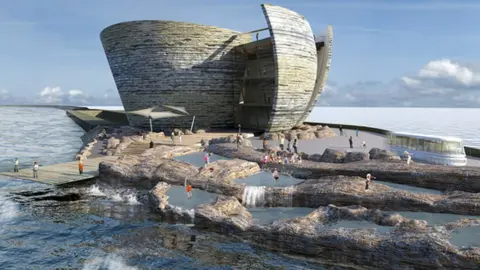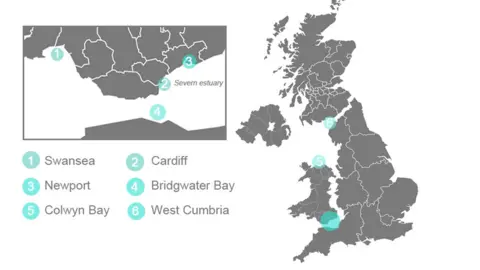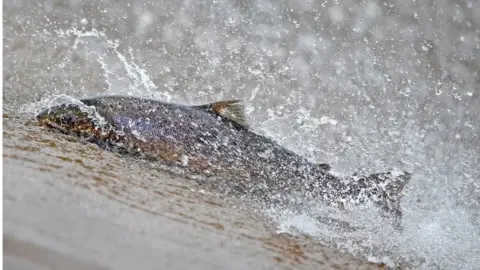Swansea tidal lagoon review head Charles Hendry 'hopeful'
 TLP
TLPThe author of an independent review into the planned Swansea Bay tidal lagoon said he remains hopeful the UK government will back the scheme.
It is now six months since ex-energy minister Charles Hendry's report was published, concluding that the £1.3bn lagoon would be a "no regrets" option.
The UK government is yet to respond to his findings but said it needed time to assess the lagoon's merits.
Investors have warned it risks stalling unless a green light is given soon.
The latest state of play with the project is:
- New research commissioned by Business Secretary Greg Clark has been completed and it is understood discussions are now taking place with other departments including the Treasury and environment
- Mr Clark has now agreed to meet a cross-party delegation of AMs showing Welsh support for the project
- Final evidence on the estimated impact on fish and the marine environment has been submitted to Natural Resources Wales, as part of the process of getting a marine licence
- On Tuesday, Welsh Secretary Alun Cairns said he remained supportive of the plans.
Though ministers are yet to set out where they stand, Mr Hendry told BBC Wales he believed their message had been "consistent".
"They say they are carefully considering the scheme. The election has delayed that process and there may be other factors too," he said.
"But now with Greg Clark back in place as business secretary I'm hopeful of a definitive answer soon."
Mr Hendry added that he had been "very enthused" by the degree of cross-party support for the world-first power generation project.
The proposal for a 320MW lagoon off Swansea Bay, involving a 9.5km seawall embedded with 16 turbines, is being developed by Tidal Lagoon Power (TLP).
The project was included in the Conservatives' 2015 manifesto and was granted planning permissions by then Energy Secretary Amber Rudd that same year.
However government support seemed to wane as discussions continued over the so-called strike price, a guarantee to subsidise the cost of electricity from the scheme.
The latest proposal by TLP involved a price of £89.90 per megawatt hour, guaranteed for 90 years.
By comparison, the price agreed for the new nuclear power station at Hinkley Point C in Somerset was £92.50 per megawatt hour for 35 years.
An independent review was commissioned in February 2016 to look into the viability of tidal lagoon schemes and it reported almost a year later.



Mr Hendry concluded that moving ahead with the prototype lagoon in Swansea Bay was in the national interest.
The developers had argued that it would kick-start a new industry and that a "fleet" of larger, more cost-effective lagoons across the UK coastline could follow.
TLP is based in Gloucester and the city's Conservative MP Richard Graham is the chair of the All-Party Parliamentary Group on Marine Energy and Tidal Lagoons.
He told BBC Wales he had met with Greg Clark this week and had "a good discussion".
"I think he absolutely gets it that we cannot prevaricate as a government indefinitely on this - and a decision should be made as soon as possible," he said.
Mr Graham said he had consistently made the point to Mr Clark that the tidal lagoon was "probably the most popular energy project of our lifetimes."
He added: "If we want a government that's got an industrial strategy, that's going to do innovative things, this is the project, this is the time - let's go for it."
What could the delay mean?
Richard Howard, head of energy for the Policy Exchange think-tank told BBC Wales the delay in responding to the review showed that TLP was yet to "put together a proposition to government that is sufficiently compelling".
"In the time in which this project has been developed we've seen massive, radical reductions in the cost of solar energy, offshore and onshore wind and that will continue," he said.
"So actually locking yourself into a tidal lagoon for 90 years might not actually be the right option."
As the wait for a go-ahead goes on, money is drying up for TLP with the scheme's backers now refusing to release further funds, the Financial Times reported.
David Clubb, director of Renewable UK Cymru said he was concerned that private investment that was "strongly needed" in south Wales would go elsewhere.
"Clearly every new project of this scale suggests risks - and it is right that the government should consider those risks."
"But the Hendry Review was a very in-depth, comprehensive study which took account of all of those risks and it still came to the conclusion that this was a no regrets option."
"So we would say to the government, let's act now - these sorts of opportunities don't come along very often."
A decision is needed this summer, TLP says, for work to start on the lagoon in 2019.

 Getty Images
Getty ImagesNew evidence on the impact on fish
Another hurdle remains in Wales, which is the issuing of a marine licence by the environmental regulator Natural Resources Wales (NRW).
The process started in 2014, with TLP and NRW saying they have been in "exhaustive discussions" about the impact on fish.
'Challenging'
In December 2016, NRW published figures suggesting the lagoon would mean 21% of salmon and 25% of sea trout dying each year, as they migrate to and from local rivers.
The developers strongly refuted that analysis which they claimed had "no scientific basis", branding the figures "grossly misleading".
Now they have submitted what they claim is a "finalised projection" of the development's likely impact on the marine environment, having agreed a new modelling method with NRW.
Andy Schofield, TLP's head of fisheries said the work had been "particularly challenging" as this was a world-first scheme and there was little research already available about fish behaviour in the Bristol channel.
He said the developers had looked for other examples across the world and spoken to leading experts in the field.
"The results we are now presenting show that the lagoon will have a very low impact on fish."
"The other reassurance is that when the lagoon is constructed we will have an adaptive environmental management plan in place and we will be constantly monitoring for any impact."
"We believe that these figures will now enable NRW to grant us a marine license and we hope that they will be able to do that in early 2018."
NRW will now launch a fresh consultation on the marine licence application in light of the new evidence submitted by TLP.
Ceri Davies, executive director of evidence policy and permitting for NRW, said: "We support the development of sustainable renewable energy. This development is a world-first, and the scale and the technology involved makes determining the marine licence complex."

A spokesman for the Department for Business, Energy and Industrial Strategy said the UK government was considering the recommendations and the issues which arise from a broader programme.
"We will require time to assess the merits of such a programme and determine what is in the best interest of the UK energy consumer and taxpayer in the long term and will publish its response to the Hendry Review in due course," he said.
